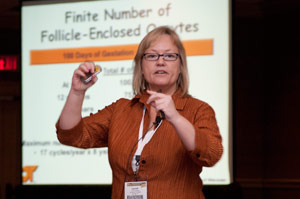Lifetime Reproductive Management I:
The Challenge of Making a Calf
by Troy Smith for Angus Productions Inc.
NASHVILLE, Tenn. (Feb. 1, 2012) — For cow-calf producers, operating in this era of high input costs only heightens the importance of breeding herd fertility. During the 2012 Cattle Industry Convention’s Cattlemen’s College, three reproductive physiologists discussed factors affecting heifer fertility and management promoting lifetime reproductive success.

“It takes two,” Lanette Edwards reminded producers, recommending they evaluate heifers with reproductive tract scoring on bulls with a breeding soundness exam. [PHOTOS BY TROY SMITH]
Opening the session, Lanette Edwards, University of Tennessee, reviewed the complexities of bovine reproductive anatomy, urging producers to consider the multitude of challenges to “making a calf.” Emphasizing that “it takes two,” she advised application of reproductive tract scoring to evaluate replacement heifer candidates and an annual breeding soundness evaluation (sometimes referred to as a BSE) for bulls.
Reminding producers of management factors affecting reproduction, including nutrition and handling, Edwards said minimizing stress factors can be particularly important during the first two weeks after breeding.
“The majority of reproductive failures are embryonic losses occurring within 14 days of fertilization, while the embryo is still in the oviduct,” explained Edwards, adding that the pregnancy becomes “pretty safe” after attachment to the placenta on about Day 42.

"We do affect the fertility of heifer calves, before they are born, by the way we feed their dams,” said the University of Nebraska's Rick Funston.
Rick Funston, University of Nebraska-Lincoln, then discussed effects on heifer fertility resulting from the dam’s nutrition during gestation. He cited research showing limited benefit to reproductive performance derived from protein supplementation of mature cows grazing winter range or cornstalks. However, supplementation does affect the calves the cows are carrying.
“We weaned more live calves out of supplemented cows, and the calves may wean a little heavier,” said Funston, citing results of fetal programming studies. “We do affect the fertility of heifer calves, before they are born, by the way we feed their dams.”
Fertility was reduced in heifers born to cows not receiving supplement. In addition, steer calves born to those cows ultimately produced carcasses of lighter weights and fewer carcasses graded upper Choice for quality.

SDSU’s George Perry concluded the session with a discussion of heifer development to promote lifetime productivity.
South Dakota State University’s George Perry concluded the session with a discussion of heifer development to promote lifetime productivity.
“Heifers that are properly developed and conceive early in the breeding season have increased longevity compared to heifers bred late in the breeding season,” stated Perry.
“Using the target weight system and developing heifers to 60% of mature weight (by breeding time) results in more heifers breeding early and sets them up to breed early for the rest of their lives.”
-----------------------------
Editor’s Note: The above article was written under contract or by staff of Angus Productions Inc. (API). It may not be reprinted without express permission of API. To request reprint permision, contact the editor at 816-383-5200.
www.4cattlemen.com is an event coverage site provided by the editorial team at Angus Productions Inc. (API), publisher of the Angus Journal, the Angus Beef Bulletin, the Angus Beef Bulletin EXTRA and the Angus e-List. For questions about this site, to submit an article for our consideration, or to report a broken link, contact the editor at 816-383-5200; 3201 Frederick Ave., Saint Joseph, MO 64506.
API claims copyright to this web site as presented. We welcome educational venues and cattlemen to link to this site as a service to their audience.

